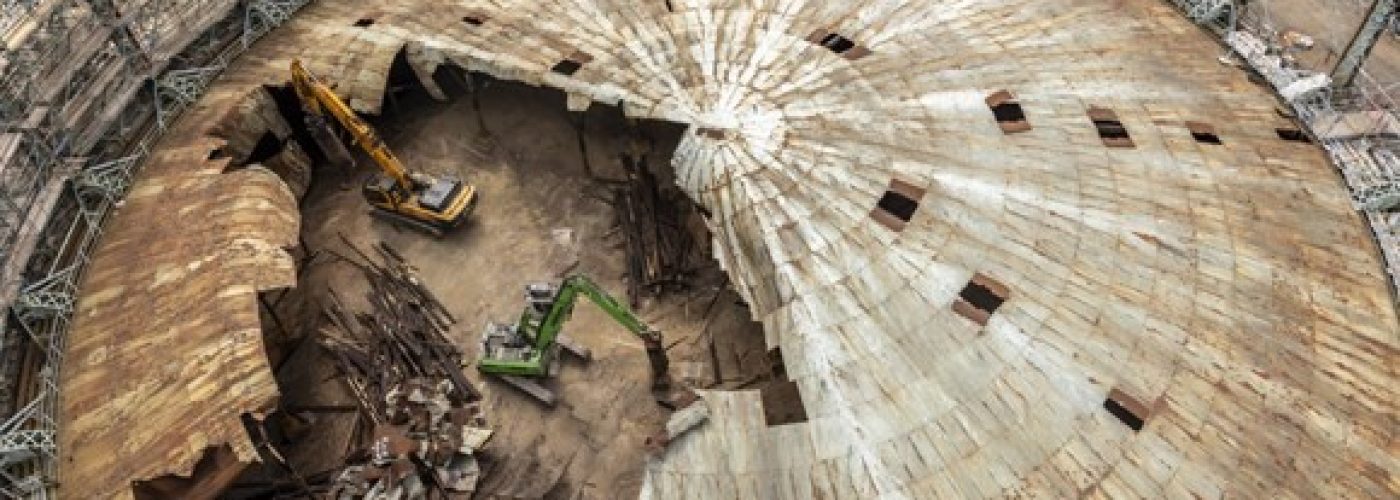The bell that floated up as water filled the historic gasholder in Granton Waterfront has been taken apart to make way for work to begin to restore the original 76 x 46 metre frame to look like new again.
The City of Edinburgh Council plan to open up the area to create a new and exciting multifunctional public space as part of their wider £1.3bn regeneration project to create a new sustainable coastal town at Granton Waterfront.
McLaughlin & Harvey began work on the site in January of this year on behalf of the Council using £16.4m from the UK Government’s Levelling Up Fund. The Scottish Government has also provided an additional £1.2m to provide a high quality public park within the gasholder frame.
The space within the restored gasholder is to have multi-sensory play zones, a dedicated space for permanent and temporary public art, a relaxation area, outdoor trails and tracks for exercise as well as a large outdoor space for sports, markets, seasonal events, community use, festivals, performance arts, exhibitions and play. Work will also be carried out to plant trees, shrubs and wildflowers improving biodiversity and local habitat in the area.
Council Leader Cammy Day said:
It was really dramatic to see the bell being ripped apart by the machinery. It marked a historic moment as this iconic structure will be transformed now to move on with the times to serve a completely different purpose for the local community to enjoy arts, sports and culture for future generations to come. Now the bell has gone the contractor can get on with the exciting work to transform the frame back to its original glory which will be seen for miles around.
The scale and ambition of the gasholder nicely mirrors that of this £1.3bn regeneration project where we are using brownfield land to build a new sustainable 20-minute neighbourhood which is well linked to surrounding communities and is somewhere residents will be proud to live. We’ve already started building some of the thousands of environmentally friendly affordable homes planned and active travel routes, along with recently completing the restoration of the former Granton Station building to become a modern workplace and cultural hub, with public square.
UK Government Minister for Levelling Up, Dehenna Davison, said:
The Granton gasholder has been part of Edinburgh’s skyline for over 120 years, and will soon be brought back to life as a real community asset.
The bell’s removal will ensure the structure can be restored to its former glory, whilst the space will be brought into the 21st Century by becoming a destination for families, residents, and future generations to enjoy.
We’re delighted to have supported this project through £16.4 million from the UK Government’s Levelling Up Fund which will ensure this iconic structure will serve as a beacon to people in the area for many years to come.
Seamus Devlin, McLaughlin & Harvey Civil Engineering Director, said:
McLaughlin & Harvey is delighted to be main contractor for the restoration works at Granton gasholder. We bring with us a wealth of experience in the civil engineering sector, and look forward to completing the deconstruction of the bell this week and the removal of the walls in the upcoming weeks.
Fascinating gasholder facts
- Over 100K rivets holding the structure together
- Total cost of original construction £18,968.
- Was opened in 1901, making it 122 years old.
- It’s since been painted 72 times.
- 26 columns in total with a height of 42m. each column is 9.3m apart.
- Granton was one of 12 gas storage tanks for the greater Edinburgh area. These 12 tanks had a combined capacity of 175,000 cubic meters of storage. At the time they were in operation the demand was around 28,000 cubic meters an hour (at its peak).
- The lowest tier was erected with the use of a steam locomotive crane.
The Granton Gas Holder is unique as the umbrella which supports the tank roof when the system is not pressurised, was made from timber as opposed to cast iron. These timbers were in remarkably great condition when demolition began.
Building, Design & Construction Magazine | The Choice of Industry Professionals





